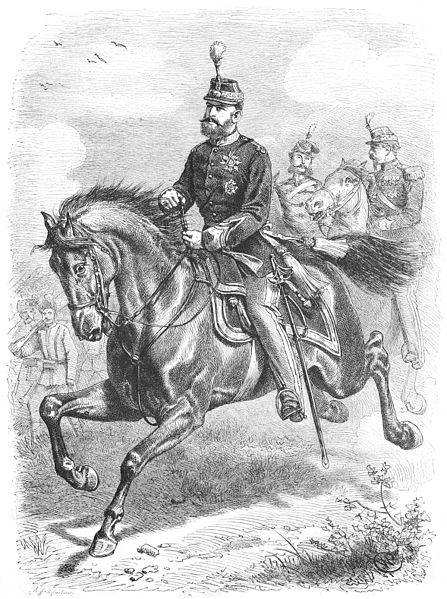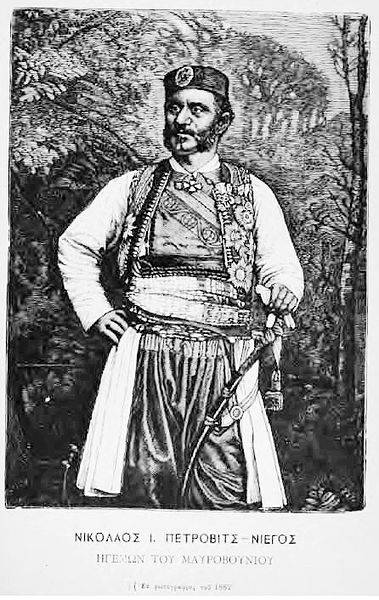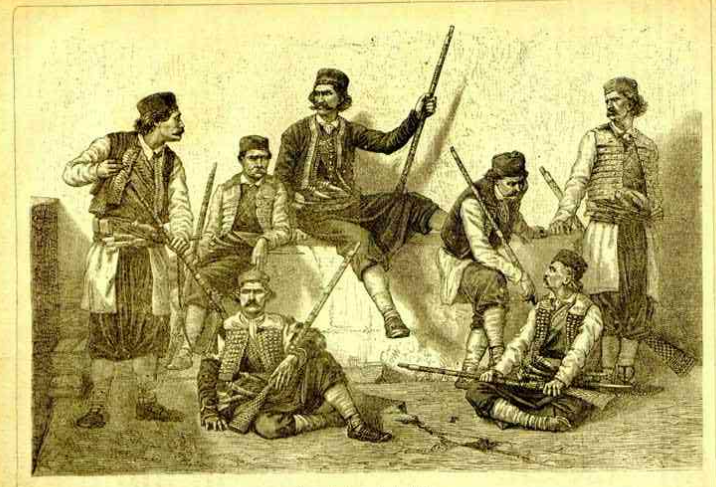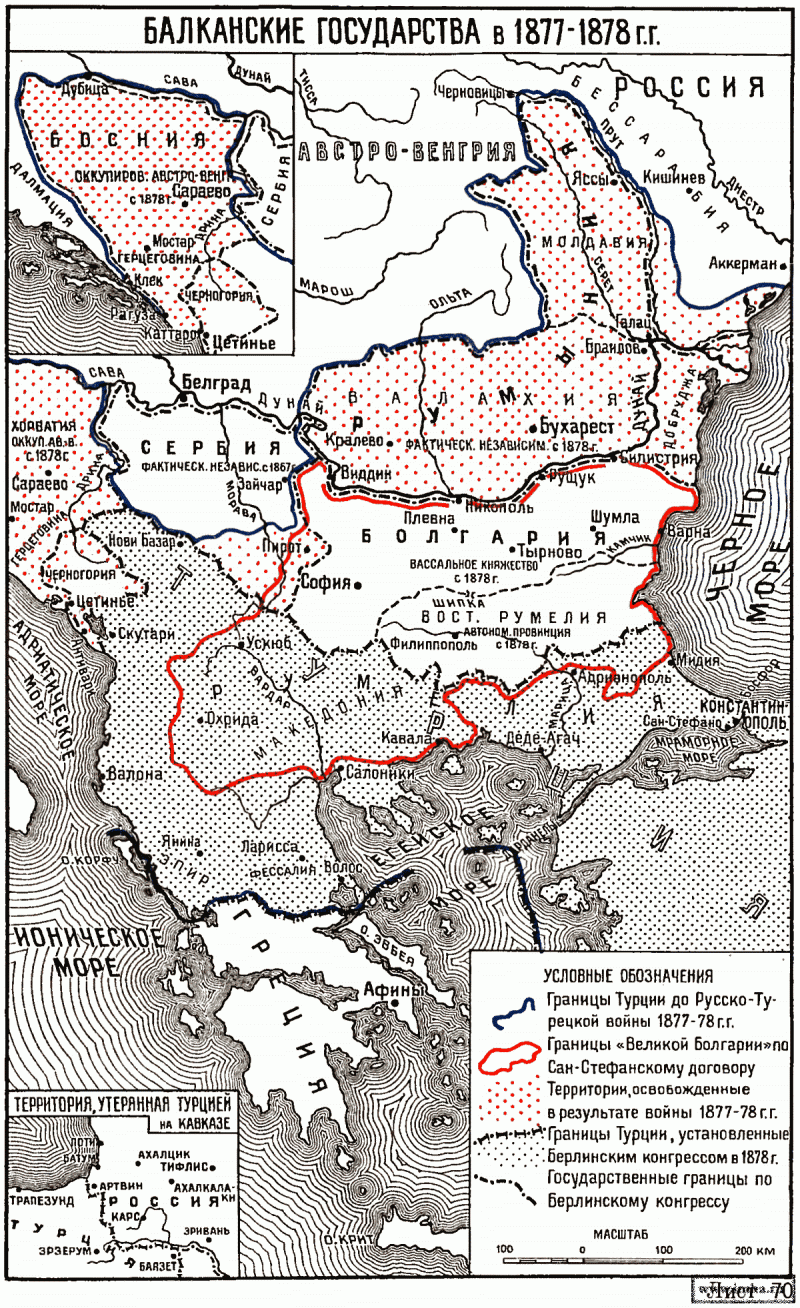Speech by Montenegro on the Russian side distracted a large grouping of the Turkish army
Bucharest agreed to military cooperation with Russia, subject to the provision of an independent sector of the front of the Romanian army and complete independence in the conduct of military operations. Russian military minister D. A. Milyutin wrote: “Romanian troops may be allowed to act in one or another theater of military operations, but nevertheless by agreement with the commander-in-chief of the Russian army. It is impossible to allow the troops of two states to act completely independently and without communication between themselves on the same theater of war. ” Petersburg noted that it had enough strength for the war with Turkey, but it was stated that if Romania considered it a matter of honor to take part in the war, the Russian command was ready to conduct it jointly, subject to the operational subordination of the Romanian army to the Russian headquarters. The parties were not able to come to a concrete agreement on military cooperation between the two armies.
After the war began, the military leadership of Russia still believed that Romania’s participation in it was desirable. However, the Foreign Ministry and Tsar Alexander himself believed that the Russian-Romanian military alliance could complicate Russia's relations with Austria-Hungary (Vienna feared strengthening of Romania, since the Hapsburg empire included areas historically inhabited by Romanians) and impede the conclusion of peace. According to the king and his inner circle, the main task of the Romanian army was to defend its territory, to divert part of the Turkish army to itself. The Romanian government also feared that the Austro-Hungarian Empire could intervene in the war if Romania entered into it.
As a result, the very logic of the war forced Romania to enter the war. As soon as the Turks learned that the conclusion of the April Convention, they fired on the Romanian cities on the Danube. The society was outraged by such aggression and demanded to declare war on Turkey. 9 (21) May 1877, under public pressure, the Romanian parliament adopted a declaration on the independence of the country and declared a state of war with the Turkish Empire. This decision was greeted by the people with enthusiasm. People at the demonstrations sang: "Awake, Romanians." Russian military correspondent N. V. Maksimov wrote from Bucharest: “The jubilant crowd ... moved through the streets, forming tapestries ... I felt how the whole mass of the people was happy, jubilant around me calmly and solemnly."
The reaction of the Western powers was different. The entry of the Russian army into Romania and the declaration of independence by Bucharest were met with hostility in the capitals of Western Europe. The governments of England, Austria-Hungary, Germany, France and Italy announced that they still consider Romania to be a vassal of the Ottoman Empire, and that the question of its independence can be resolved only after the end of the war. Only Russia supported the independence of Romania.
11 (23) in May a law was passed to annul the tribute to Porte and to allocate the amount of 914 thousand lei to the army, which Romania previously paid to Turkey annually. In total in Romania mobilized about 100 thousand people. Men aged from 21 to 46 were involved in military service. Conscripts, depending on the draw, were enlisted in the standing or territorial army. In the standing army, citizens served from 21 to 25 years, then they were in reserve until 29 years. In the territorial army, active service was in the infantry from 21 to 27 years, in cavalry from 21 to 26 years. In reserve, the territorial army were up to 29 years. Those who did not have the lot to serve in the standing or territorial army, and those who served their terms, were enlisted in the police. In the militia, men served up to 37 years, and from 37 to 46 years they served military service in the National Guard (in the cities) or in the militia (in the countryside).
The highest combined arms unit was the corps. It consisted of two divisions, reserve artillery (36 guns) and a cavalry regiment. The division included 16 infantry battalions, 8 cavalry squadrons and 18 guns. The battalion numbered 600-800 people, the squadron - 100 horsemen and 20 foot soldiers. The artillery had 24 batteries, 6 guns each. The guns were Krupp's state-of-the-art production facilities. The infantry was armed with rifles of the Peabody Martin, Draise, and Krnka systems. The whole Romanian army consisted of two corps (4 divisions). There were more than 58 thousand people in it. The Armed Forces also included the Danube flotilla: 2 armed steamboats, gunboat and several transports. Great help in the material equipment of the Romanian army was played by Russia, which at the end of April supplied Romania with 25 thousand Krnk rifles, 36 million rounds of ammunition, 20 heavy guns, 12 mortars, 9410 shells, 4 cars with gunpowder. In May, Russia provided Romania with a loan of 4 million lei.
The Romanian people, although on the whole lived in poverty, actively supported their army. The total amount of people's donations was 10 million lei, which allowed 60-thousand to be fed. army for 300 days. Villagers voluntarily donated grain and other products to the troops. The main source of supply of the army with food and feed was requisition, which was estimated at 11 million lei.
The 1 Corps (1 and 2 Divisions) were concentrated in the Calafat area and the task of protecting the border from Turnu-Severin to Calafat. The 2 Corps (3 and 4 Divisions) was located in Southern Wallachia, covering the Romanian capital from a possible strike by the Turkish army.

Ruler of Romania Carol I (Karl)
Montenegro
The war of Russia against Turkey opened up an opportunity for Serbia and Montenegro to fulfill its century-long dream - to achieve complete independence from Porta. However, the situation in these countries was difficult. After losing the war with Turkey, Serbia was forced to conclude a truce with Porto in November 1876. Montenegro joined the truce. But the military tension in the Balkans persisted, the war could resume at any time.
In order to assist Belgrade in restoring the fighting capacity of the defeated army, the chief of staff of the Vilna military district, A.N. Nikitin, was sent to Serbia. He was assigned to thoroughly study the state of the Serbian army, draw up a plan for its reorganization, and then implement it. For this purpose, a subsidy was allocated in 1 million rubles. It was supposed to involve in this work Russian officers who had already arrived in Serbia as volunteers, and who were specially seconded. In December, 1876, Nikitin arrived in Belgrade. On his recommendation, the head of Serbia, Prince Milan, began mobilization and sent around 1 thousands of Serbian regular troops and a division of volunteers to the Kladov area, who, if the war resumed, were supposed to hold the Kladov until the Russian army approached. In this area, the Russian forces planned to force the Danube. The preparation of transfer means has been started.
The mission of General Nikitin, however, had no success. In December, 1876. Serbia and Montenegro extended the truce with Turkey for another two months. After that, mobilization in Serbia was canceled. Prince Milan declared that it would be better for Russia not to count on armed support from Serbia. General Nikitin reported to the Main Headquarters: “Serbia does not want to fight ... I consider useless of a further stay. No hope of restoring Serbian military forces. ” 16 (28) February 1877, Serbia concluded a peace treaty with Turkey on condition that the pre-war situation was maintained. Serbia declared Turkey only 14 on December 1877, when it became apparent that Turkey was losing the war with Russia.

Montenegrin Prince Nikola I Petrovich
Montenegro took a different position. Unlike the Serbs, the Montenegrins in the war with Turkey were not defeated and even won a number of victories. The Turks suffered serious losses. Therefore, Montenegro was in no hurry with the conclusion of a peace agreement on pre-war conditions. At the talks, which were conducted in Constantinople, the Montenegrin delegation insisted on meeting the minimum requirements: joining the Kuch area to Montenegro and guaranteeing the safety of refugees from Herzegovina when returning them to their homes. The port, seeking to preserve the vassal dependence of Montenegro, refused to go forward. Negotiations interrupted. Montenegro remained at war with the Ottoman Empire.
Therefore, the news of the beginning of the Russian-Turkish war was greeted in Cetinje with joy. As soon as the news of the beginning of the war came to Montenegro, the Montenegrins rejoiced. Now you could count on victory with a centuries-old enemy. 25 April (7 May) 1877 was decided to fight at the military council before the official recognition of Montenegrin independence by the Port. After the end of the truce, the ruler of Montenegro, Prince Nikola (Nikolay), announced the resumption of hostilities against Turkey and notified St. Petersburg about this. Montenegrin delegation left for Chisinau. Montenegrins informed the Russian command of the plans and the whole of Montenegro in the war and asked for help in their implementation.
In May, the colonel of the General Staff A. A. Bogolyubov, and several Russian artillerymen, engineers and sappers were sent to Montenegro as a military adviser in May 1877. Montenegro presented two 9-pound and two 4-pound cannons with 2 thousand shells. At the request of the Montenegrins, the Russian government provided a monetary subsidy in the amount of 50 thousand ducats per year for the needs of the war. A new sanitary unit of the Red Cross moved to Montenegro to provide medical care. In Russia, the collection of donations in favor of Montenegro has begun.
Thanks to Russian aid, Montenegro strengthened its army. She was small. A country with a population of 200 thousand people could put about 20 thousand soldiers. The army had a militia character. During the war, it called on all combat-capable men. Of the warriors (militias) formed two divisions. Each division consisted of two brigades of 5-battalion personnel. The size of the battalion ranged from 500 to 800 fighters. The battalions bore the name of the area where they were formed. The main tactical unit was the company (the couple), which consisted of people from the same community (zadrugi). The size of the mouth also fluctuated. Montenegrins were in service with their weapons. It usually consisted of a gun, a yatagan (hanjara) and a pistol (revolver). The Montenegrin troops did not have either a convoy or logistic support. Every warrior warrior took care of himself. Food was usually delivered to families. Montenegrin warriors lived outside their territory mainly at the expense of the local population and the reserves seized from the Turks. Care for the sick and wounded also lay on the families, relatives of each warrior.
By the beginning of the fighting, the army of Montenegro had about 40 battalions. Artillery numbered 16 mountain cannons. The main forces, the army, 17 thous. Of fighters, were concentrated in the north of the country - there were 20 battalions under the command of Peter Vukovich. The eastern border was covered by 6 battalions under the command of Lazar Sochitsy, and Bosch Petrovich's 14 battalions were located on the southern border.
The Ottoman Empire concentrated on the borders of Montenegro three corps totaling 52 thousand people. At the head were experienced commanders - Suleiman Pasha, Mehmed Ali Pasha and Ali Saib Pasha. Having almost triple superiority in forces, the Turkish command decided to withdraw Montenegro from the war before the Russian army launched an offensive. The Turkish offensive began on May 21 (June 2). The Turks struck from three directions: north, east and south. Turkish troops were able to break into the depths of the country. Petersburg was reported: “Montenegro is in a critical situation. If the Turks go to Cetinje by the combined forces, their success is likely. Bosses begin to get lost. The troops fight well, but they are terribly tired, and the losses are too great. The valleys of Belopavlichy and Lukov were burned down, the inhabitants fleeing to the mountains a great disaster, especially since the country is also filled with Herzegovina ”.
The Western powers proposed Montenegro to capitulate. However, the Montenegrins have kept faith in the victory and support of Russia. Montenegrin warriors put up fierce resistance. Thus, the performance of Montenegro and its heroism in the face of the superior forces of the Turkish army were important. The Montenegrins distracted a large grouping of Turkish troops, and the weak seriously weakened the Turkish Danube army. This contributed to the creation of a favorable strategic environment for the opening of Russian hostilities in the Danube Theater. Montenegrins at this time proved their position as the most devoted Russian allies.
In turn, the beginning of the offensive of the Russian army saved Montenegro from an imminent military disaster. The withdrawal of Suleiman Pasha’s troops from Montenegro enabled the Montenegrin Prince Nikolai to launch a counter-offensive. Nikolai gathered 11 thousand people and launched an offensive against them on Nikshich, which was taken on 9 of September. The siege and assault of Nikshich was attended by Russian mountain and 9-pound weapons donated by Montenegro, under the command of the Russian officers Heisler and Tsiklinsky. After the fall of Nikitich, Montenegrin military operations were aimed at cleansing the fortifications occupied by Turkish troops, mainly in the area of the Dugi mountain pass. September 25 troops commander Peter Vukovich captured the fortifications at Dugskogo mountain pass. Thus, the territory of Montenegro was cleared from the Turkish troops. In the future, Prince Nikolai decided to take military action outside of Montenegro, striking a blow at the Anti-Privari (Bar), the port of the Adriatic Sea.

Montenegrin Warriors

Information